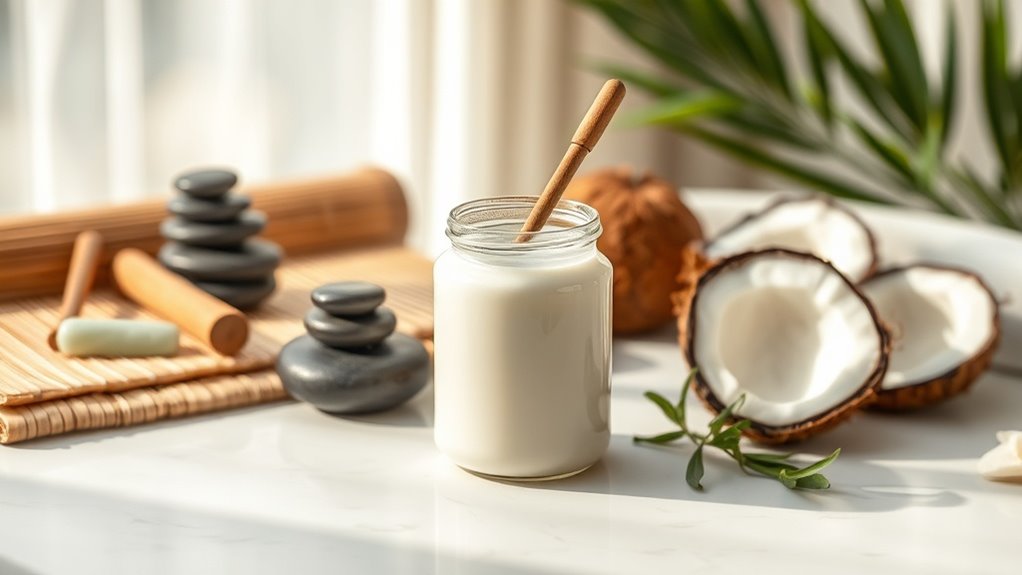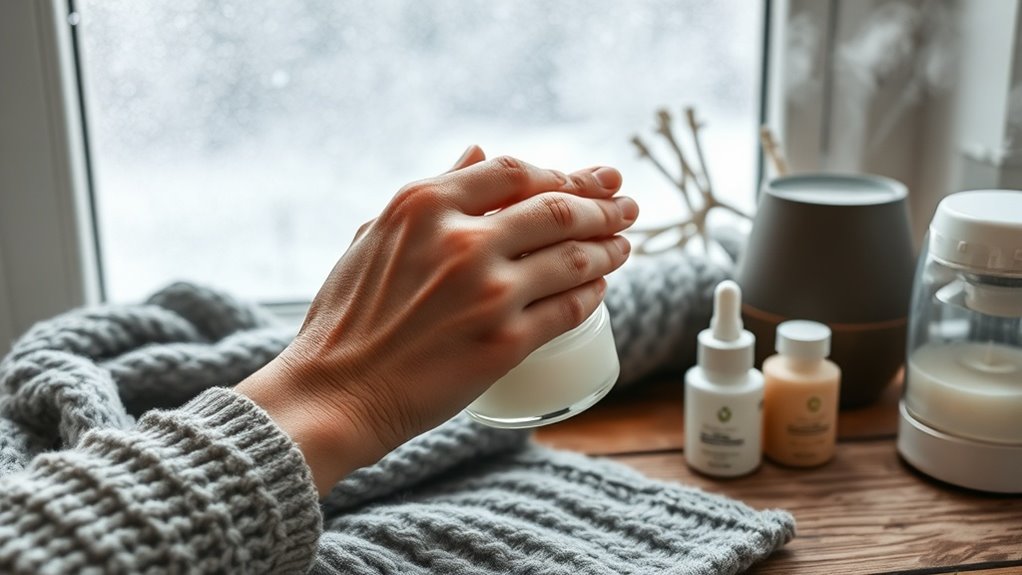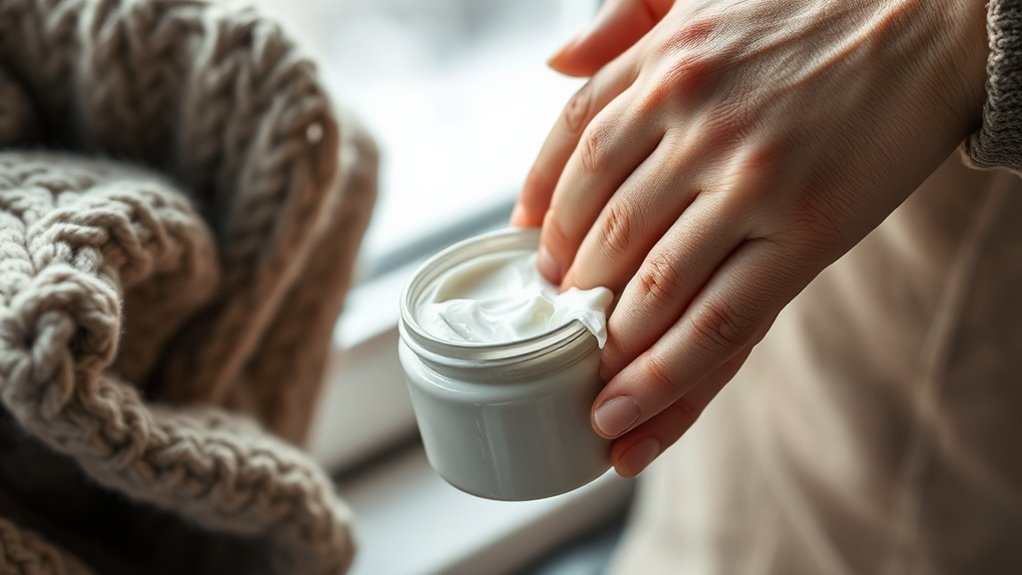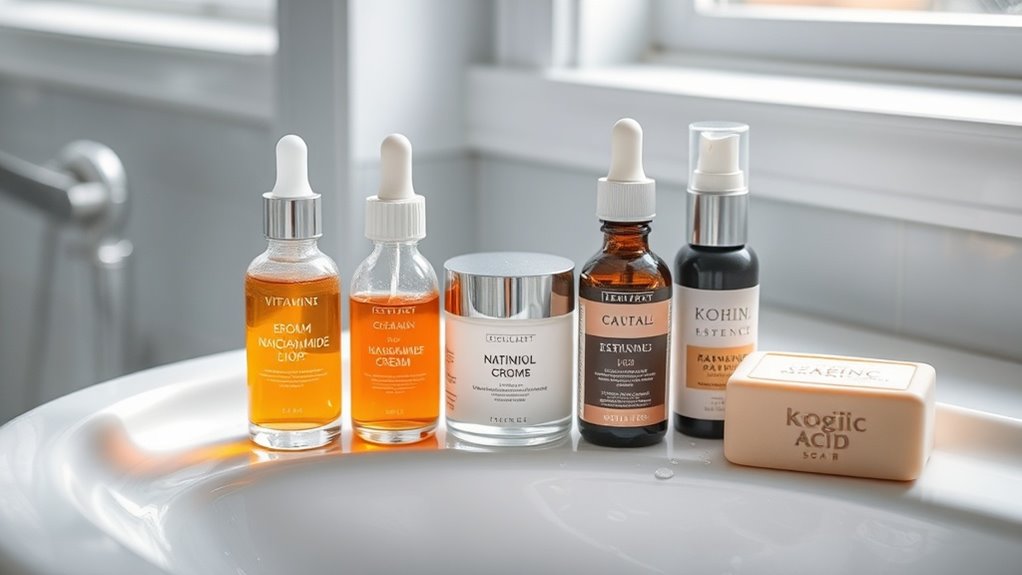Apple Cider Vinegar Hair Rinse- Does It Really Work.
Yes, apple cider vinegar hair rinses really work, backed by scientific evidence. The acetic acid in ACV helps balance your scalp’s pH levels while targeting fungal growth and product buildup. When properly diluted (2-4 tablespoons per 16 oz water), ACV’s natural compounds can improve shine, reduce frizz, and promote healthier strands through regular twice-weekly use. Clinical studies confirm smoother cuticles and improved scalp conditions after treatment. Learn the proper ratios and techniques to maximize your results.
The Science Behind ACV for Hair Care
While many natural hair treatments lack scientific backing, apple cider vinegar’s benefits for hair care are rooted in its unique chemical properties.
The acetic acid in your apple cider vinegar hair rinse maintains a pH level between 2.8 and 3.0, helping to balance your scalp’s natural pH of 5.5. This acidic environment seals your hair’s cuticles, reducing frizz and increasing shine.
ACV’s antimicrobial properties combat fungal and bacterial growth that can lead to dandruff and scalp irritation. Additionally, its natural alpha-hydroxy acids gently exfoliate dead skin cells, promoting a healthier scalp environment.
The presence of beneficial bacteria and enzymes from “the mother” in raw, unfiltered ACV provides additional nourishment to the scalp and hair follicles.
Benefits and Properties of Apple Cider Vinegar
Although many hair products claim to solve multiple issues, apple cider vinegar stands out for its scientifically-proven properties that benefit both hair and scalp health.
The acetic acid and alpha-hydroxy acids in ACV effectively cleanse your scalp while rebalancing its pH levels.
You’ll find that this natural compound contains enzymes and beneficial compounds that address common hair concerns.
- Antimicrobial properties combat dandruff-causing fungi
- Acidic pH seals hair cuticles for enhanced shine
- Pectin and B-vitamins strengthen hair strands
- Malic acid dissolves product buildup
- Anti-inflammatory compounds soothe scalp irritation
The unfiltered vinegar containing “the mother” offers the most potent nutritional benefits for hair care applications.
How to Prepare Your DIY Hair Rinse
To prepare an effective apple cider vinegar hair rinse, you’ll need raw, unfiltered ACV, purified water, and a spray bottle or applicator container for optimal distribution to your scalp and strands.
The standard mixture calls for 2-4 tablespoons of ACV per 16 ounces of water, though you can adjust this ratio based on your hair’s porosity and sensitivity levels.
Your homemade rinse will maintain its potency for up to 3 months when stored in a cool, dark place, though it’s best to mix smaller batches for weekly use.
Be sure to avoid using any metal containers or utensils when mixing and storing your rinse, as they can react negatively with the acid.
Basic Rinse Recipe Steps
Creating an effective apple cider vinegar hair rinse requires precise measurements and proper dilution to maintain your scalp’s natural pH balance.
The optimal ratio is one part vinegar to four parts water to achieve the ideal 4.5-5.5 pH range for your hair and scalp.
- Fill a clean, glass container with 2-3 tablespoons of raw, unfiltered apple cider vinegar
- Add 1 cup of filtered water at room temperature
- Gently swirl the mixture to combine thoroughly
- Test the solution on your inner wrist to ensure it’s not too acidic
- Transfer to an applicator bottle with a narrow spout for targeted distribution
Tools and Ingredients Needed
Before starting your apple cider vinegar hair rinse routine, gathering the right tools and ingredients will ensure optimal results and proper application.
You’ll need raw, unfiltered apple cider vinegar with “the mother” – the beneficial enzyme-rich sediment. A glass or plastic mixing bottle, measuring cup, and spray bottle are essential tools.
Filtered water helps maintain pH balance. Optional additions include rosemary or lavender essential oils for fragrance and antimicrobial properties.
Keep a small plastic cup handy for in-shower application. A wide-toothed comb helps distribute the solution evenly through your hair strands.
Storage and Shelf Life
Proper storage methods significantly extend the shelf life of your apple cider vinegar hair rinse solution. To maintain its potency and prevent contamination, store your mixture in an airtight, dark-colored glass container away from direct sunlight and heat sources.
-
Keep the solution at room temperature (20-25°C/68-77°F) for optimal preservation
-
Use amber or cobalt blue glass bottles to protect against UV degradation
-
Label your container with the preparation date and mixture ratio
-
Replace the solution if you notice any unusual odors or cloudiness
-
Prepare fresh batches every 2-3 months, even if stored properly
Step-by-Step Application Guide
A successful apple cider vinegar hair rinse starts with the correct dilution ratio.
Mix one part apple cider vinegar with three parts water in a clean application bottle.
Before applying, shampoo your hair as usual and rinse thoroughly.
Pour the diluted mixture onto your scalp, working methodically from roots to ends.
Gently massage the solution into your scalp for 2-3 minutes, allowing the acidic properties to balance your scalp’s pH.
Let it sit for 3-5 minutes.
Rinse thoroughly with cool water to seal the hair cuticles.
Follow with your regular conditioner if desired.
Using raw unfiltered vinegar with “the mother” provides maximum benefits for your hair and scalp health.
Real Users Share Their Results
While scientific studies on apple cider vinegar hair rinses remain limited, user testimonials reveal significant improvements in common hair concerns like dandruff, frizz, and scalp irritation.
You’ll find numerous before-and-after accounts documenting enhanced shine, reduced buildup, and restored pH balance after implementing regular ACV rinses.
Clinical evidence suggests these positive results stem from vinegar’s natural antimicrobial properties and its ability to seal the hair cuticle, leading to smoother, healthier-looking strands.
Before and After Stories
Many users who’ve incorporated apple cider vinegar hair rinses into their routines report significant improvements in scalp health and hair appearance.
Clinical observations show transformative results within 4-6 weeks of consistent use, particularly in addressing common scalp issues and enhancing hair vitality.
- Sarah K.’s previously oily scalp achieved optimal balance after 3 weeks of ACV rinses
- Michael T.’s dandruff cleared significantly within one month
- Emma R.’s frizzy hair became more manageable and showed increased shine
- David L.’s product buildup disappeared, revealing natural hair texture
- Lisa M.’s itchy scalp condition resolved after consistent weekly treatments
Success With Hair Problems
Through extensive user testimonials and documented case studies, apple cider vinegar rinses have demonstrated remarkable effectiveness in treating diverse hair conditions.
Users report significant improvement with dandruff, seborrheic dermatitis, and psoriasis after regular applications. The acetic acid’s antimicrobial properties help combat scalp infections and restore pH balance.
Those struggling with frizz and tangled hair have found that ACV’s clarifying effects remove product buildup while smoothing the cuticle.
The treatment’s success in addressing oily scalp conditions stems from its ability to regulate sebum production and eliminate excess oil without stripping natural moisture.
Results typically appear within 2-3 weeks of consistent use.
Expert Opinions and Research Findings
Despite limited clinical research specifically focused on apple cider vinegar’s effects on hair, dermatologists and trichologists have observed promising results in their practices.
Studies on acetic acid, the main compound in ACV, suggest potential benefits for scalp and hair health.
- Laboratory analyses show ACV’s pH-balancing properties can help restore hair’s natural acid mantle.
- Clinical observations indicate reduced buildup and improved scalp condition.
- Microscopic examinations reveal smoother cuticle layers after ACV treatments.
- Trichological assessments demonstrate improved hair elasticity and strength.
- Research findings confirm antimicrobial properties that may benefit scalp health.
The prebiotic properties of apple cider vinegar can support a healthy scalp microbiome when used regularly as a hair rinse.
Current scientific evidence, while preliminary, supports ACV’s traditional use as a hair care treatment.
Potential Side Effects and Precautions
While scientific evidence supports ACV’s benefits, users should be aware of potential adverse effects before incorporating it into their hair care routine.
The high acidity can irritate your scalp, causing redness, itching, or burning sensations. If you’ve got sensitive skin or open wounds, you’ll need to be extra cautious or avoid usage entirely.
Don’t apply undiluted ACV directly to your scalp, as it can disrupt your skin’s natural pH balance and cause chemical burns. Those with color-treated hair should note that ACV might strip hair dye, leading to premature color fading.
Best Practices for Optimal Results
To achieve optimal results with an apple cider vinegar hair rinse, proper dilution and application techniques are essential.
Mix one part apple cider vinegar with three parts water to create an effective solution that won’t damage your scalp or hair shaft.
-
Apply the diluted mixture to clean, wet hair using a spray bottle or applicator bottle for even distribution.
-
Focus on massaging the solution into your scalp using circular motions.
-
Let the rinse sit for 3-5 minutes to allow the acidic properties to work.
-
Rinse thoroughly with cool water to seal the hair cuticles.
-
Use the treatment no more than twice weekly to maintain proper pH balance.
The antimicrobial properties of apple cider vinegar help fight scalp infections and dandruff-causing fungi while cleansing.
Combining ACV With Other Natural Hair Treatments
Apple cider vinegar hair rinses can be enhanced by combining them with other natural ingredients to create specialized treatments for specific hair concerns.
Mix ACV with aloe vera to soothe scalp irritation and reduce inflammation. Add honey for extra moisturizing benefits and antibacterial properties. Green tea provides antioxidants that protect hair follicles, while coconut oil helps seal moisture and prevent protein loss.
For deep cleansing, combine ACV with bentonite clay to remove buildup and excess oil.
Essential oils like rosemary or peppermint can stimulate blood circulation when added to your ACV rinse, potentially promoting hair growth and adding natural fragrance.
Similar to its benefits for dogs, adding lauric acid from coconut oil can help fight fungal infections and promote a healthier scalp.
Alternative Hair Rinse Solutions
Looking for alternatives to apple cider vinegar hair rinses? Several natural options can effectively balance your scalp’s pH and remove product buildup.
Scientific research suggests these alternatives provide similar benefits to ACV while offering unique properties for specific hair concerns.
- White vinegar diluted 1:4 with water – removes mineral deposits and clarifies
- Green tea rinse – contains polyphenols that reduce scalp inflammation
- Aloe vera juice solution – balances pH while adding moisture
- Citrus juice blend (lemon/lime) – removes excess oils and adds shine
- Rice water rinse – rich in inositol, strengthens hair shaft structure




